On July 20, 2005, same-sex marriage was legally recognized nationwide in Canada. Fifteen years on, we asked a sampling of Canadians—some recently married, some separated, some celebrating years of matrimony—reflect on what marriage equality means to them.
Here’s what they told Xtra’s Megan Jones about their nuptials, the politics of marriage and how far the country still has to go to achieve equality for LGBTQ2 people.
Alice Buckley, from Toronto
Alice Buckley with partner April and their daughter, Camilla. Credit: Photo by Camilla Pucholt; courtesy Alice Buckley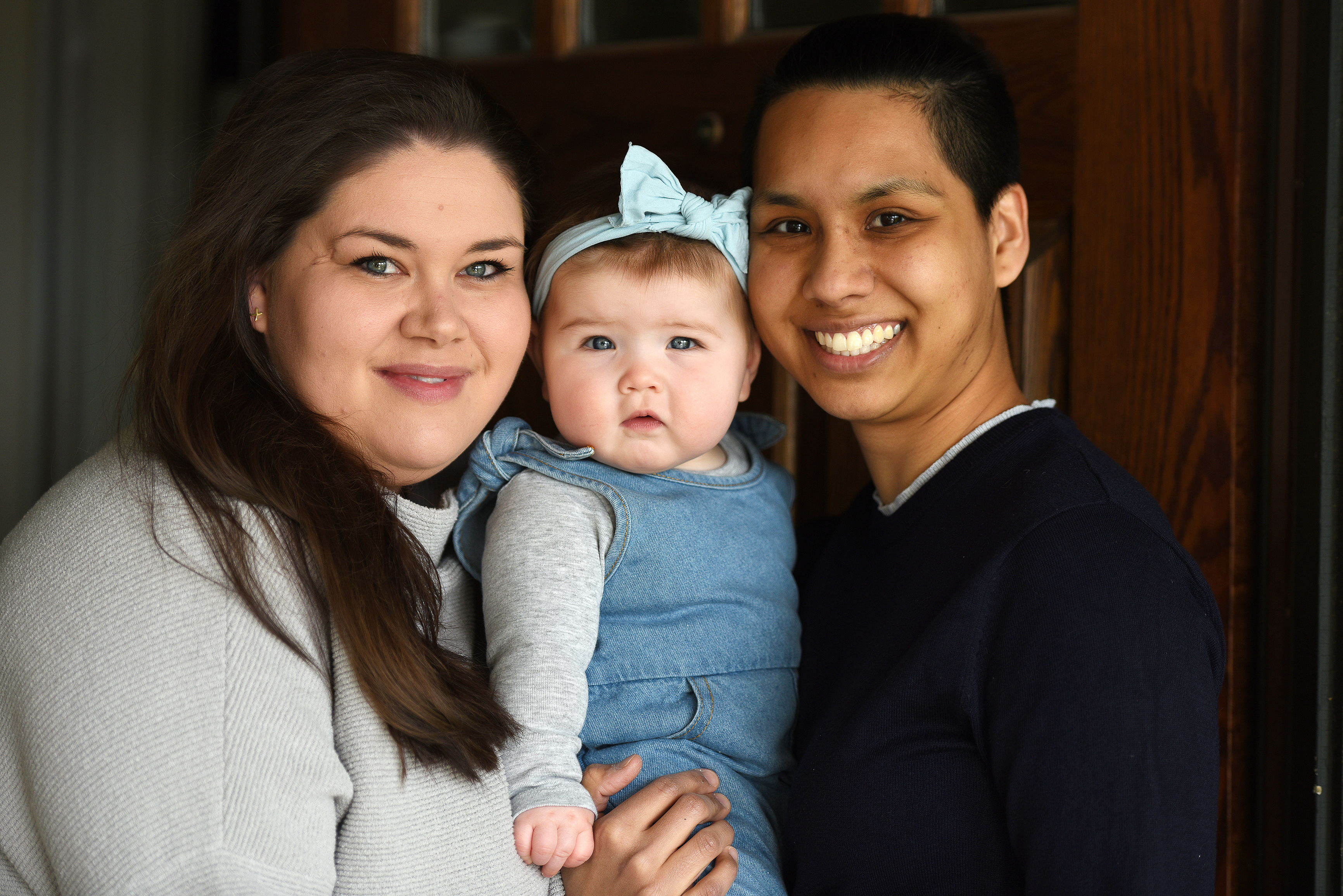
In 2013, I moved to Toronto from the U.K. on a work visa. Two months into my stay, I met my wife, April. We danced together at Crews and Tangos, a queer bar in the city’s Gay Village, one evening and became inseparable almost instantly. We pulled the typical lesbian U-Haul.
When my visa was set to expire 10 months later, we started to consider our options. Before meeting April, I imagined I’d go back to the U.K. and reapply for a second permit to work in Canada. But after spending basically every day together, we weren’t keen on that plan. In the end, we decided we would get married. I already knew she was the person I wanted to spend the rest of my life with. I’d had other serious relationships before, but I’d never felt as trusting of someone as I do with April.
My parents didn’t know I was gay at the time, so the clock was ticking to come out. I sent my dad an email letting him know that I was engaged. Both he and my mother took it in stride, and two weeks later they travelled to Canada to see us tie the knot.
We’ve been married for six years now, and everything I felt about April and our relationship has turned out to be true. I’m a pretty fiery person, but we basically never fight—I think it’s because she is so patient and calm. As time goes on, our relationship grows deeper and deeper roots. I value that we’re really respectful of each other—and I’ve never had that before in a relationship.
Last October, our daughter, Camilla, was born. Seeing April become a parent has made me fall even more deeply in love with her. She’s like the child whisperer—even kids who don’t know her flock to her. She’s incredibly energetic and warm and fun, and I’m so thankful she can bring those qualities to our child’s life.
Before I met April, marriage equality wasn’t something I thought much about. I wanted other queer folks to have the right to marry, but it didn’t mean much to me personally. Without the ability to get married, though, our lives would look completely different today. I might not live in Canada; I might not still be with April. I owe my child’s life to marriage equality, and my kid is one of the most amazing things that’s ever happened to me. I’m so thankful for this family we’ve built.
Damien Leggett and Joe Denis, from Winnipeg
Damien Leggett and Joe Denis married in April despite COVID-19 shutdowns. Credit: Courtesy Damien Leggett and Joe Denis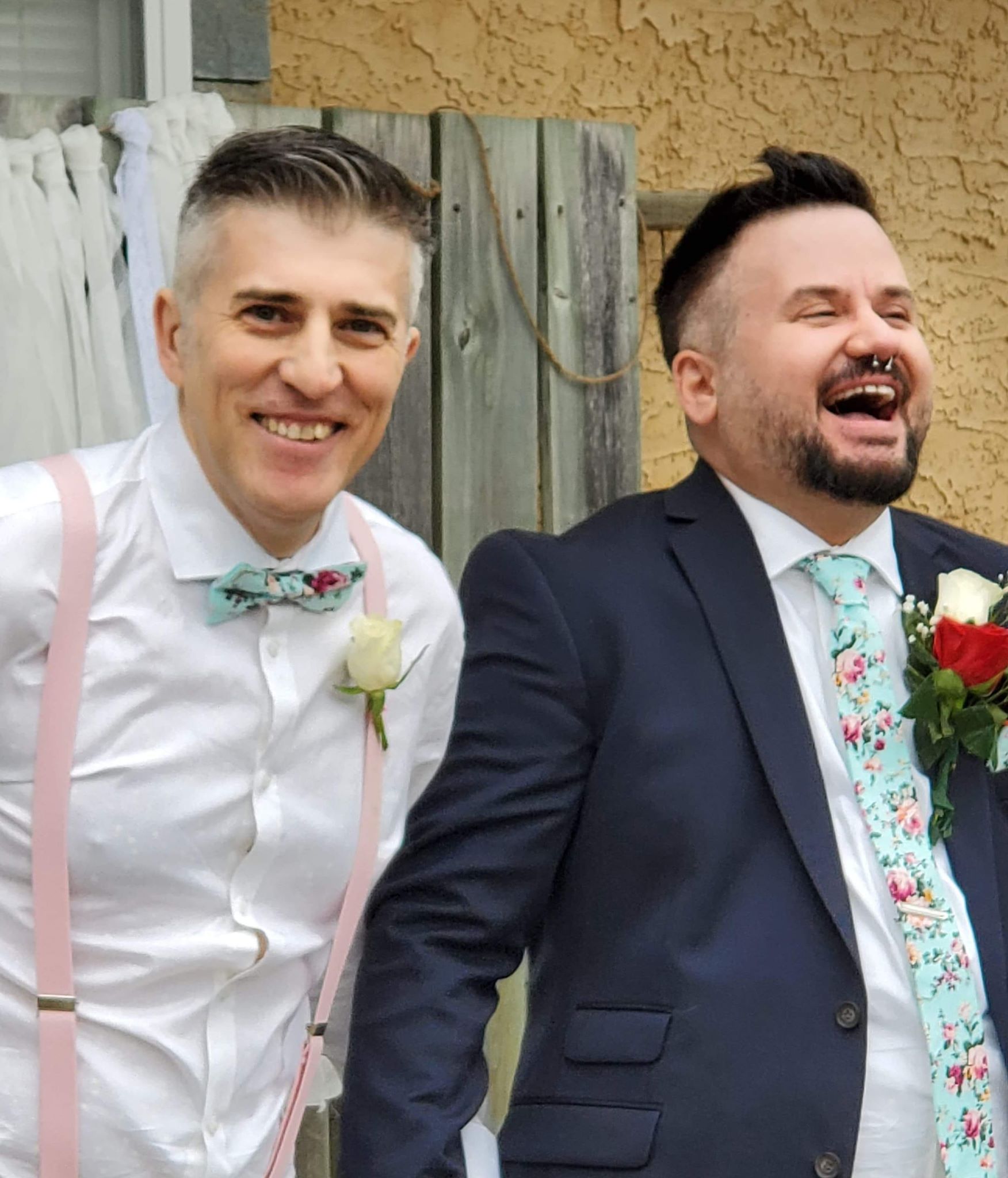
Damien: Two years ago, just before Craigslist shut down their personals section, I put out a Hail Mary ad saying I was looking for my soulmate. As a trans guy, I often got approached by people looking for sex, or who were interested in me as a novelty. But Joe responded to my ad saying he was looking for an emotional connection.
Joe: We emailed and texted back and forth. I’m 52, so getting to know someone through a screen was a different experience for me. I’m used to looking someone in the eye when I’m talking to them. But because Damien has children, and because he’s trans, he said he needed a sense of trust before meeting up. I’d never dated a trans person before. I respected his boundaries.
Damien: I’m 41, and texting felt fine to me! But of course I was excited to meet. On our first date we went to get crepes. I could barely meet his gaze because he was so handsome. I was really shy.
Joe: At the end of the date I drove him home and asked if I could have a kiss. He gave me a peck and ran out to the car! It was so cute.
Damien: As we got to know each other, we realized we had a lot in common. We both value social justice and want people to be treated with dignity. We both care about animals (and I even convinced Joe to become a vegetarian!). We each try to love everybody and everything that we encounter.
Joe: My last partner died of cancer after we’d been together for 15 years. I didn’t want to date casually. I valued that our relationship was full of trust and integrity and openness from the beginning.
Damien: Before I met Joe, marriage was not on my radar. But Joe comes from a Catholic background and mentioned that marriage was important to him. I thought, “Okay, he’s the person I want to spend the rest of my life with, so if marriage is important to him, it feels right to me.”
Joe: In November 2019, I asked him to meet me in Bonnycastle Park, a historic gay park in Winnipeg. I got down on one knee and asked him to marry me, and we both bawled our eyes out.
Damien: We planned a small wedding for April 2020. But COVID-19 forced us to pare it down. We kept our original date and set up a socially distant wedding in our backyard. I got a bunch of supplies at the dollar store and put together homemade decorations in an attempt to make our dilapidated yard look a little cuter. We were allowed a maximum of 10 people and placed balloons at least two metres apart so everyone knew where to stand.
Joe: We got a beautiful cake made by a local baker. A friend of Damien’s streamed the ceremony on Facebook Live, and two of Damien’s kids tuned in over Skype. During our vows we had everybody crying.
Damien: It’s funny, we’re two men who got married, but on paper we technically have a “heterosexual marriage” because I haven’t changed my gender marker. The nuances of queerness and attraction and love are so deep.
We might be able to get married with ease, but homophobia is alive and well. There are still LGBTQ2 folks that are severely marginalized. Gay people are thriving far more than trans people are in this country. Trans women of colour are especially vulnerable. Many trans folks can’t walk down the street safely. I’m thankful to have someone to face the fights ahead with, because we as a community need to keep fighting.
Travis Cannon, from Montreal
Credit: Courtesy Travis Cannon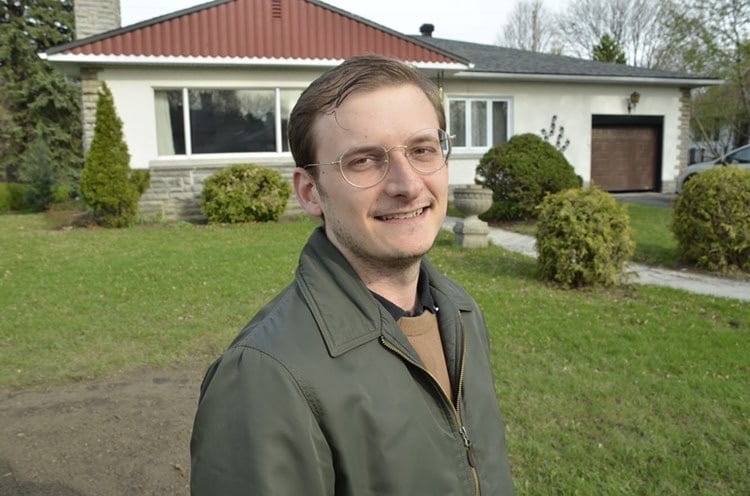
When my ex-husband and I first met in 2009, neither of us thought we’d ever want to get married. We had yet to turn 20 and had recently started university in Montreal. There we found radical queer politics—and each other. We quickly fell into an intense young love. It was the first time either of us had been in a relationship.
Politically, we didn’t think marriage should be held up as some sort of aspirational institution. And we didn’t like the ways that mainstream queer activism dissipated after marriage equality came into effect. But five years into our relationship, in 2014, my ex, who is from the U.S., found out his visa was set to expire. We were deeply in love and wanted to stay in each other’s lives. We set our radical queer politics aside and got engaged. I remember joking back then that we’d have to keep the fact that we were married hush-hush. At the same time, I realized some of the ways in which the fight for marriage equality affected us personally: Marriage became a politically useful tool we could leverage to stay together.
I was surprised by how much the wedding ceremony ended up meaning to me. Our families and close friends came, and it was powerful to stand in front of the important people in our lives and declare how much we loved one another. It made what is normally a private, shared intimacy public.
We stayed together for nearly four more years. The end of our relationship wasn’t particularly dramatic—there was no Marriage Story-style breakdown. The reality is that we were teenagers when we met, and we realized we’d grown into very different people. My ex and I agreed that to continue that growth, it would be best to separate.
I learned a lot from being married, and from going through a separation. My biggest takeaway is that a relationship will be stronger when the both halves remember they are separate parties with individual needs—even if those needs sometimes create conflict.
I think about whether I would ever marry again fairly often. I value the public celebration of love and the idea of committing to someone long-term. And of course, there are legal benefits to formal marriage. But I’ve also been thinking about ways to have all of that in my life without walking down the aisle.
Brooke Xiang and Szu Shen, from Vancouver
Credit: Courtesy Szu Chen and Brooke Xiang. Photo by Angela Ho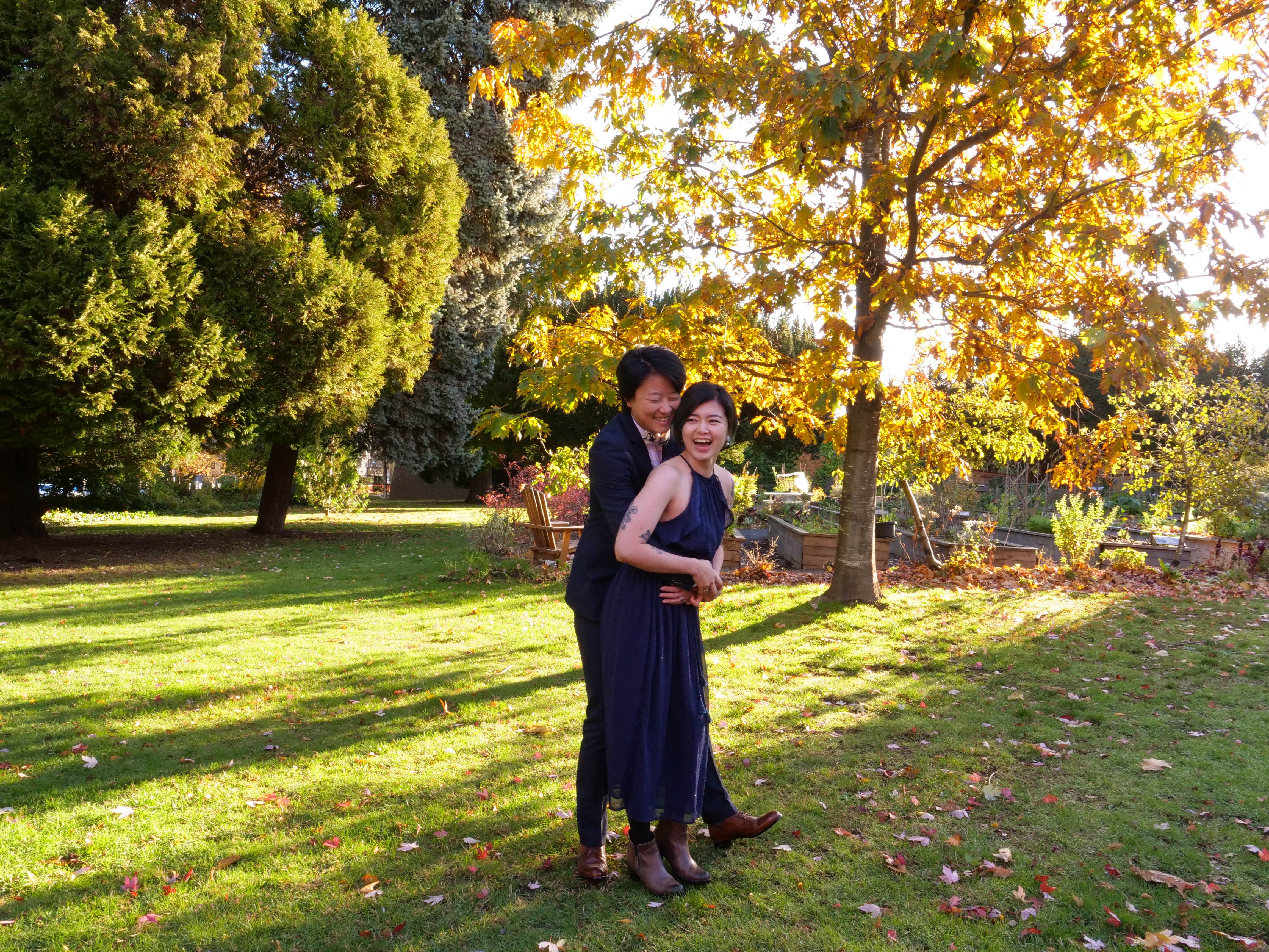
Brooke: I met Szu in 2015 when I started grad school at the University of British Columbia. Szu had begun her PhD, and we had the same thesis supervisor, who asked her to show me the ropes. As we got to know each other, I developed a big crush. But she was in a long-distance partnership at the time and had never been in a queer relationship before.
Szu: My boyfriend and I had been together for seven years. So I was kind of like, “Well, this is it, I’m going to spend my life with this person.” But after meeting Brooke, something came over me. We started hanging out all the time, and I realized I had feelings for them. I started to reflect on other incidences in my life that in retrospect were definitely queer, but that I wasn’t able to identify as such at the time. My feelings for Brooke became so strong that I knew it wouldn’t be fair to anyone for me to ignore them and lie to myself.
Brooke: Because she had previously been dating someone, Szu had to be the one to admit her feelings first. When she finally did, I was elated but also in shock. I was like, “Wait, you’re sexually attracted to me?” We talked it out and when I left I remember closing the door and doing a stupid dance and being like, “Yessss!”
We became a couple. I was struck by how intelligent and caring Szu is, and how fun and silly we could be together. We moved in together in 2016, and registered to be common-law as soon as we could. So by the time we started talking about marriage, it almost didn’t feel like that big of a deal. In a lot of ways we were already kind of married.
Szu: I’d always wanted to settle down with someone. Building a stable family of my own has been a long-term goal. For me, marriage was less about the piece of paper and more about officially affirming the commitment we have to one another.
Brooke: We got married on Szu’s birthday at a tiny coffee shop we both love. Just our closest friends were there. As a non-binary person, I was thrown by the language we had to use. During the ceremony the officiant had to refer to us as either a “bride” or a “groom.” There was no neutral option. It was kind of shitty to get misgendered at my own wedding. But we got the ceremony over with quickly then went out to celebrate with our friends and it was lovely.
Szu: I find it amazing that marriage equality has been in place for 15 years in Canada. In my home country, Taiwan, people only secured the right to marry last year. Being able to marry Brooke brought me a lot of love and joy. I feel very grateful to be here.
Kirsti Mathers McHenry, Toronto
Jennifer used to crash lunches with a friend and me, and I was always happy to see her. It was 2003, and we ran in the same circles—we’d often run into each other at parties. By the next year, we admitted we had feelings for each other and became a couple.
About a year into our relationship, same-sex marriage became legal. I was caught off guard by how emotional the decision made me. As a queer person, and as a lawyer-to-be, I’d been following the case closely. But I don’t think I realized how much it mattered until it was on the horizon. Some of the big human rights fights—like Criminal Code amendments on gay sex—had already been fought by the previous generation of queer folks, and we were the beneficiaries of that work. Marriage equality felt like our first generational fight. It was so exciting.
We both realized early on that we could build a great life together. We supported each other’s careers, we lifted each other up, we belonged to the same loving set of friends. In 2007, we tied the knot. It was a two-part celebration. Jennifer is also a lawyer, so the first ceremony was a real law-geek wedding. We asked Justice Susan E. Lang, who had managed the same-sex marriage case through the Ontario Superior Court, to preside over the ceremony. We also had other Court of Appeals justices there as witnesses. I hope it was meaningful for them to see the happiness that came from the legal decisions they’d made.
Then we had a bigger celebration, where we stood up in front of all our people and promised to love each other forever and to always contribute to the queer community. We danced the night away on Toronto’s Queen Street West and had a really great time. Some of our family members got to meet our gaggle of hilarious friends for the first time. I think the whole experience affirmed how strong queer love in all its forms could be to our straight family members.
Jennifer has taught me a lot about patience and love and kindness. I know she always has my back. When we became parents, she was the one who carried our children. At the time, that meant that I wasn’t legally considered a parent—I was gutted by that.
We decided to try to get the law changed, and Jennifer was completely in that fight with me. She never treated me as less of a parent than her. She had my back, and we took on the Ontario government and we got the law changed. That she did all that with me and for me is the best expression of the type of marriage we have. In 2015, the All Families Are Equal Act passed, allowing a non-biological parent to be listed on a child’s birth certificate from the outset.
I believe there should be no argument about love. If two consenting adults want to love one another, if people want to take care of each other and sign up to be each other’s families, why would anyone stand in the way of that?
Legacy: July 21, 2020 8:57 amA previous version misspelled Szu Shen’s surname. The story has been updated.
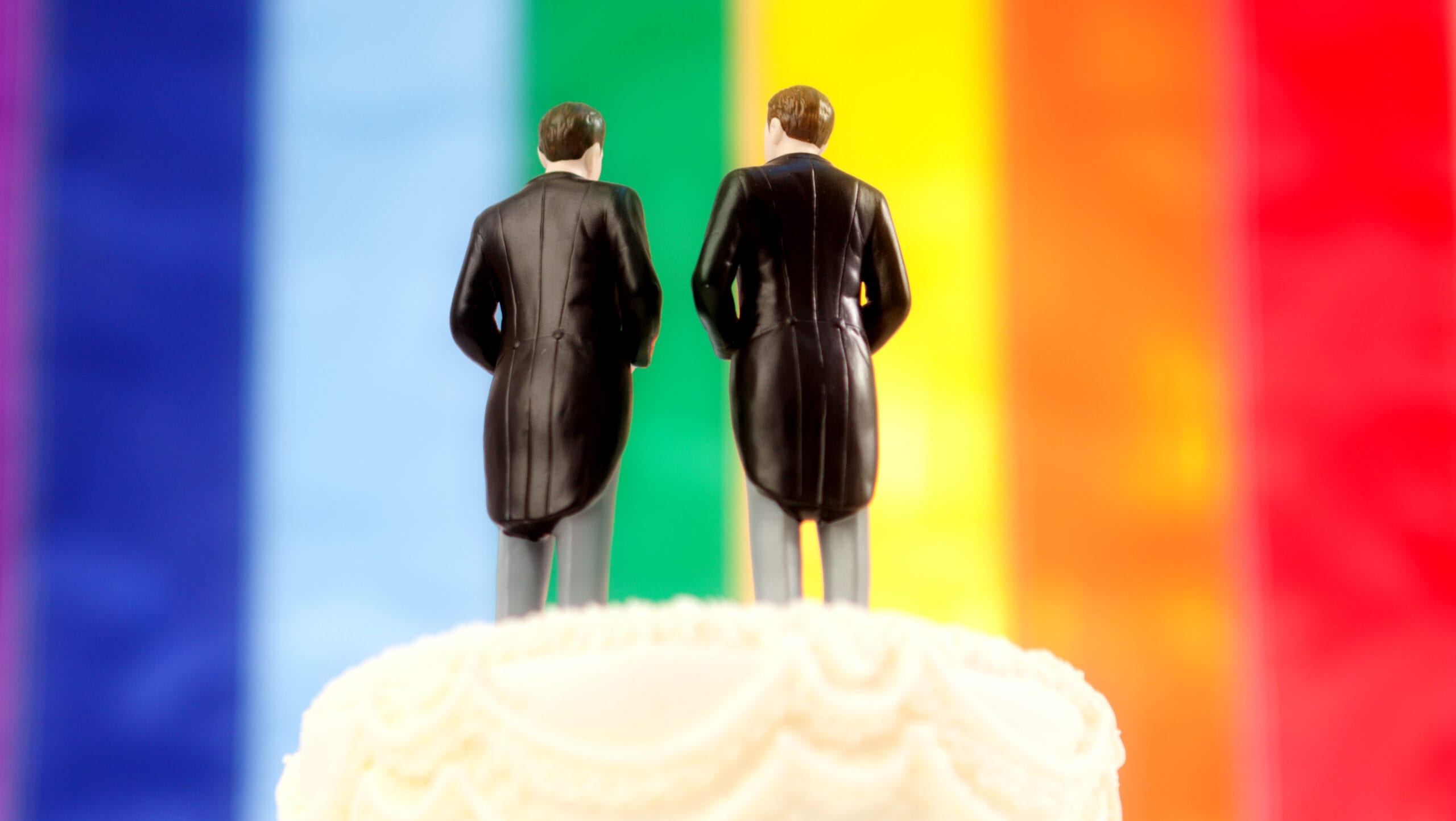

 Why you can trust Xtra
Why you can trust Xtra


